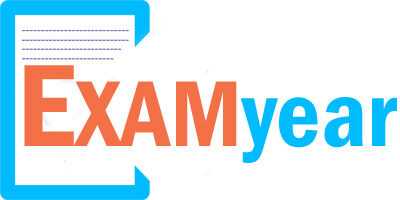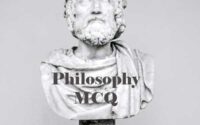Philosophy Sample Question Papers
On this page, Applicants can check the below links for downloading the Philosophy Sample Question Papers. The Philosophy Sample Question Papers will be helpful for the applicants in their preparation. Hence, the people can begin the practice by downloading Philosophy Sample Question Papers.

The Philosophy Sample Question Papers may not contain the originally asked questions. Free downloading links of the Philosophy Sample Question Papers are enclosed below.
Sample Question on Philosophy
1. For Rorty epistemology believes the mind to work on empirical reality to:
(A) mirror it
(B) negate it
(C) transcend it
(D) rationalize it
2. Merleau Ponty does not regard the lived-body as a:
(A) physical object
(B) zero point
(C) reflexive touch
(D) incarnate reflection
3. Dewey regards inquiry as a process of constant revision, since it is:
(A) self-assertive
(B) self-negating
(C) self-conscious
(D) self-corrective
4. Sarvodaya consists of:
(A) Truth, non-violence and self assertion
(B) Truth, non-violence and self denial
(C) Truth, non-violence and self development
(D) Truth, non-violence and possessiveness
5. Secularism in India does not maintain:
(A) the de-publicisation of religions
(B) the de-politicization of religions
(C) a principled distance from religions
(D) the commitment to religious pluralism
6. The constitution is:
(A) not only a noun, but also a verb
(B) either a noun or a verb
(C) neither a noun nor a verb
(D) only a noun, but not a verb
7. Social democracy is a mode of:
(A) Government
(B) individual living
(C) institutions
(D) associated living
8. Free and compulsory education is a …………………….. in India.
(A) fundamental right
(B) social right
(C) political right
(D) cultural right
9. Sarvodaya does not imply:
(A) the private good
(B) the common good
(C) the dignity of labor
(D) the dignity of work
10. What, according to Kautilya, is most conducive for the stability of the state?
(A) Establishing peace
(B) Victory in war
(C) Strict governance
(D) Treasury full of resources
11. In Kautilya’s policy of governance, which factor is regarded as the strong point of the king?
(A) Advice of the chaplain
(B) Efficient network of spies
(C) Able Ministry
(D) Active administrative officers
12. According to Locke, State of Nature is a state where there is:
(A) Freedom from the interference of others
(B) Perfect and complete liberty to conduct one’s life as one best sees fit
(C) A state without morality
(D) No civil power to whom men can appeal
13. Berlin associated negative liberty mainly with:
(A) Classical liberal tradition
(B) Communitarianism
(C) Modern liberalism
(D) Communism
14. Which of the following thinkers argues for “a state of affairs in which men are treated as the equal beings which in fact they already are, but are not already treated as being”?
(A) John Locke
(B) Hobbes
(C) John Rawls
(D) Bernard Williams
15. In Robert Nozick’s view which one of the following is not among the three main principles that should be accounted for in an adequate theory of Justice?
(A) A principle of Justice in acquisition
(B) A principle of Justice in transfer
(C) A principle of Justice in rectification
(D) A principle of Justice in decision making
16. For Amartya Sen capabilities as freedom refer to:
(A) Ability to take informed decisions
(B) To be able to do what one wishes and desires to
(C) The presence of valuable options or alternatives effectively available to the agent
(D) Freedom to sell one’s produce freely at a desired price
17. Arguing for minority rights Kymlicka distinguishes between which two types of ethnocultural groups?
(A) National minorities in multination states and Ethnic groups in Polyethnic states.
(B) International minorities in polyethnic states and ethnic groups in multination states.
(C) National minorities in Polyethnic states and Ethnic groups in multination states.
(D) Ethnic groups in multination states only
18. Michael Sandel’s critique of liberalism with reference to rational choice is based on his emphasis upon:
(A) Voluntarily picked up social attachments
(B) Involuntarily picked up social attachments
(C) Impossibility of rational choice altogether
(D) Impossibility of social dialogue among equal partners
19. Who among the following thinkers argues that nature is given to all mankind by God for its common subsistence, one cannot take more than his own fair share?
(A) John Locke
(B) Hobbes
(C) John Rawls
(D) Rousseau
20. Most of the feminist theories suppose that the complex of psychological traits and dispositions that characterize a person as either “masculine” or “feminine” — as well as the relations between genders are:
(A) Genetically formed
(B) Naturally presented
(C) Socially constructed
(D) Determined by oneself
More Question Papers on Philosophy
| Question Papers | Question Bank |
| MCQ Objective | Practice Set |
| Selected Question | Mock Test |
| Typical Question | Old Questions |
| Test Papers | Sample Papers |
| Important Question | Model Question |
21. Which of the feminist theory emphasizes upon women’s financial dependence upon men as the main reason for their subjugation?
(A) Radical Feminism
(B) Ecofeminism
(C) Liberal Feminism
(D) Socialist Feminism
22. Consider the following statements with reference to valid deductive argument and choose the incorrect statement:
(A) All its premises are true and conclusion is also true.
(B) All its premises are true but its conclusion is false.
(C) All its premises are false and its conclusion is also false.
(D) All its premises are false but its conclusion is true.
23. According to quantity, propositions are divided into ………………….. .
(A) Universal and Particular
(B) Universal and Existential
(C) Affirmative and Negative
(D) Necessary and Probable
24. Example of Law of Excluded Middle is …………………… .
(A) A thing cannot be both ‘a circle’ and ‘not a circle’
(B) A circle is a circle
(C) A thing is both a circle and not a circle
(D) A thing is neither a circle nor a not-circle
25. If the Truth-value of ‘T’ proposition is True (T), the truth-values of ‘A’ and ‘E’, ‘O’ are …………… respectively.
(A) T, F and undetermined
(B) Undetermined, F and F
(C) Undetermined, F and undetermined
(D) F, undetermined and T
26. Identify the fallacy committed in the following argument:
“The pleasure of an individual is good for him. Therefore the pleasure of everybody is good for everybody.”
(A) Division
(B) Composition
(C) Fallacy of Accident
(D) Converse Fallacy of Accident
27. The Rule of Detachment is:
(A) Rule of Formation only
(B) Rule of Transformation
(C) Rule of Formation and Rule of Transformation
(D) Neither a Rule of Formation nor a Rule of Transformation
28. Which of the following theories represents Ethical holism?
(A) Anthropocentric morality
(B) Land Ethics
(C) Deep Ecology
(D) Shallow Ecology
29. Indian Ethics do not support any kind of euthanasia on the grounds that:
(A) Life is immaterial and one doesn’t have to bother about the type of death.
(B) Any thought of death is sinful.
(C) Life is a divine gift and one gets it as per the result of past Karmas.
(D) Any thought of death is meaningless.
30. Consequences of technology on human life are studied under:
(A) Metaphysics
(B) Epistemology
(C) Philosophy of technology
(D) Philosophy of art
31. The thesis that, “there is a fundamental ontological distinction between natural things and artifacts” is closely related to ……. .
(A) Ethics
(B) Epistemology
(C) Philosophy of social science
(D) Philosophy of technology
32. Ethical codes prescribed to lawyers is ……………………. ethics.
(A) Medical
(B) Social
(C) Professional
(D) Utilitarian
33. What is not included in the definition of health given by WHO?
(A) Physical well-being
(B) Mental well-being
(C) Social well-being
(D) Political well-being
34. Branch of ethics which deals with the ethical issues with biology and medicine is called:
(A) Philosophy of biology
(B) Philosophy of medicine
(C) Bioethics
(D) Environmental ethics
35. Instrumental and consumerist approach towards environment is called ……………. .
(A) Shallow ecology
(B) Deep ecology
(C) Cosmocentric ecology
(D) Green ecology
36. ……………… takes into consideration the intrinsic value of the environment.
(A) Shallow ecology
(B) Deep ecology
(C) Anthropocentric view
(D) Utilitarian view
37. Choose the correct order of the stages of life according to pratityasamutpada of Buddhism:
(A) Bhava, Vedana , Jati and Upadana
(B) Bhava, Jati , Vedana and Upadana
(C) Vedana , Upadana , Bhava and Jati
(D) Bhava, Vedana , Upadana and Jati
38. Consider the following statements with reference to the schools of Vedanta and mark the correct code:
(1) Shankara accepted Nirguna brahman and rejected Saguna brahman
(2) Shankara and Ramanuja accepted Saguna brahman
(3) Shankara accepted both Saguna and Nirguna brahman
(4) Shankara and Ramanuja both rejected Nirguna brahman
Codes:
(A) Only (1) is true
(B) Only (1) and (4) are true
(C) Only (2) and (3) are true
(D) Only (3) and (4) are true
39. “Brahman and the Jiva are different but they have the potential to be identical” is the philosophical perspective of:
(A) Advaita Vedanta
(B) Visishtadvaita Vedanta
(C) Dvaita Vedanta
(D) Jainism
40. Select the incorrect statement with reference to the Vedic sacrifice from the following:
(A) The sacrifice is enjoined by the Veda
(B) The Vedic Gods are invoked in the sacrifice, but they are only instruments for the proper completion of the sacrifice
(C) It is not the case that, the result of the sacrifice is produced by an inherent potency—the Apurva
(D) Out of the many kinds of sacrifices enjoined, one among them has its aims the fulfilment of the desire of the person performing the sacrifice
41. Which one of the following theories of validity of knowledge is upheld by Samkhya?
(A) Svatah pramanyavada, Paratah apramanyavada
(B) Svatah pramanyavada, Svatah apramanyavada
(C) Paratah pramanyavada, Paratah apramanyavada
(D) Paratah pramanyavada, Svatah apramanyavada
42. ‘It is not the case that everything can be produced by everything merely by a change of arrangement of constituting atoms. This means to say, it is not the case that the effect is potentially pre-existent in the cause.’ This view is upheld by:
(A) Samkhya-Yoga
(B) Madhyamika Buddhists
(C) Nyaya-Vaisesika
(D) Mimamsa
43. Pramana-Vyavastha doctrine is not upheld by:
(A) Naiyayikas
(B) Mimamsakas
(C) Vaisesikas
(D) Buddhists
44. Thales, Anaximander and Anaximenes are known as:
(A) Physikoi
(B) Mystics
(C) myth-makers
(D) politicians
45. The view that human beings were playthings at the hands of powerful but morally weak deities was held by:
(A) Heraclitus
(B) Aristotle
(C) Homer
(D) Thales
46. For Plato Mathematics provides:
(A) a bridge from the sensible would to the intelligible
(B) a discontinuity from the sensible world to the intelligible
(C) an illusory means from the sensible world to the intelligible
(D) an obstacle in the sensible world to the intelligible
47. According to Aristotle, form is not:
(A) for the sake of matter
(B) immanent in matter
(C) functional in matter
(D) differential in matter
48. Who claimed that the exclusive concern of mathematics is with questions of order or measure?
(A) Leibniz
(B) Kant
(C) Descartes
(D) Russell
49. For Kant, necessity and contingency are categories of:
(A) Relation
(B) Quality
(C) Modality
(D) Quantity
50. Which of the following is incorrect match?
(A) Husserl—epoche
(B) Descartes—cogito ergo sum
(C) Spinoza—tabula rasa
(D) Berkeley—esse est percipi

